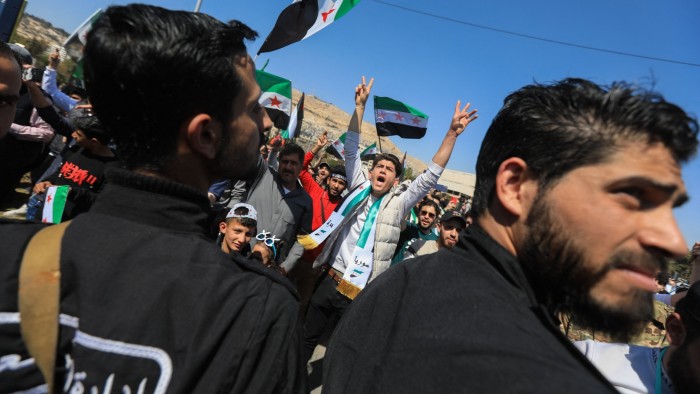Stay informed with free updates
Simply sign up to the Middle Eastern politics & society myFT Digest — delivered directly to your inbox.
The writer is author of ‘Black Wave’ and an FT contributing editor
For a brief few weeks in December and January, Lebanon and Syria were in a bubble of euphoria. In December, the ruthless Assad dictatorship fell after five decades of iron grip on Syria and more than a decade of war. A jihadist-turned-tie wearing national leader moved in to the presidential palace in Damascus. The dancing in the streets went on for weeks.
In Lebanon, there was elated disbelief when in January former army commander Joseph Aoun was elected president and gave a strong pro-reform, pro-Lebanese sovereignty inaugural speech. The surprise nomination of Nawaf Salam, former chief justice of the International Court of Justice, as prime minister, seemed almost too good to be true.
Lebanon had suffered through two decades of a Hizbollah stranglehold on its politics, including a series of assassinations carried out by the Shia militant group and the Assad regime. In 2019, the economy tanked and depositors lost their savings. Then last autumn, an Israeli war against Lebanon cost the country an estimated $14bn. The Israeli military campaign also decimated the top ranks of Hizbollah, incapacitating the group.
The mood in both countries has now sobered up, not only because of the scale of the task ahead but also because a system of vested interests is fighting back.
The clearest example of how a counter-revolution strikes back came in Egypt, after the fall of Hosni Mubarak in 2011. Young revolutionaries did not prepare for elections because they believed they had reached their destination. Meanwhile, the army and the old regime were busy clawing back power. There is no such thing as a fresh start or a clean break with the past.
In Syria, remnants of the Assad regime and Hizbollah, which helped Assad stay in power, have been trying to sabotage the transition by fomenting a coup, provoking sectarian violence and fighting to maintain control over pockets of territory. Separately, interim president Ahmed al-Sharaa is showing clear autocratic tendencies, tempered for now by his ability to learn from mistakes.
And in Lebanon, the appointment of wealth manager Karim Souaid as governor of the central bank, the Banque du Liban, was a disappointment to reformists, policy experts and depositors. Souaid is seen as too close to the banking elite — who crashed the country’s finances and are trying to evade accountability. In addition, one of President Aoun’s advisers sits on the board of Souaid’s private investment firm, Growthgate, raising concerns about a potential conflict of interest.
The cabinet vote to confirm Souaid is also a potent reminder that Hizbollah’s stranglehold on its politics was never Lebanon’s only problem. The group sustained a system in which the country’s entrenched political elites, some of them former warlords, prospered. So, business as usual?
The reaction of some has been to give up, believing that nothing makes a difference. But that is the wrong lesson to draw. In Syria, it took years of war to unseat Assad but also decades of painful sacrifices and sustained opposition to build the capacity of activists, lawyers and thinkers who can now step forward, help rebuild Syria and most importantly hold Sharaa accountable.
In Lebanon, the arrival in power of Aoun and Salam was not the result of a few months of diplomatic and political negotiations, nor was it solely made possible by the sudden weakening of Hizbollah. Rather, it was the culmination of two decades of street protests against Syria, Hizbollah and the ruling establishment, as well as repeated efforts by independent candidates to break through in local and legislative elections.
The nomination of Salam in particular was the result of an assiduous campaign by new legislators who flipped votes in parliament to block the return of a former prime minister who embodies the old regime. The next battle begins now: holding Aoun, Salam and Souaid to account in parliament, in public debate and advocacy work, and even in the streets. Too much is at stake to allow the central bank to usher in an economic amnesty, after Lebanon’s warlords were given a political amnesty at the end of the civil war in 1990.
There’s a lesson here too for Americans and even Europeans, who are dealing with a pervasive feeling of helplessness amid the chaos of the new Trumpian era. Building the rule of law and governance, or reclaiming them in countries such as Syria or Lebanon, is an unrelenting struggle — just as preserving it should be in western democracies. Every setback is part of the journey and also a call to action.
